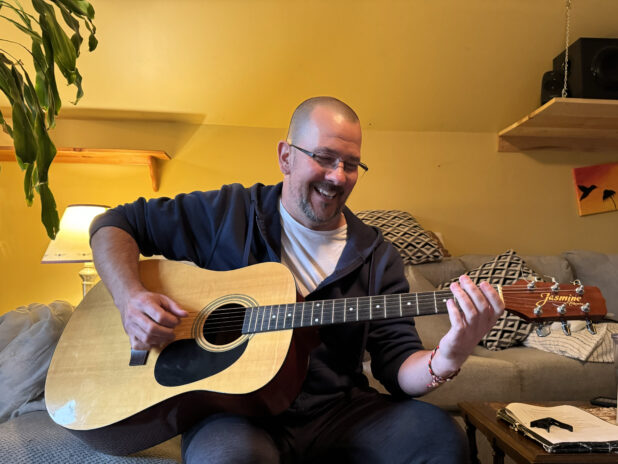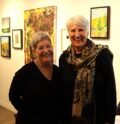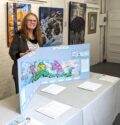Headline News
Local reporter thankful to be cancer free
October 8, 2024

By Chris Houston
In an interview on Oct. 6, local journalist Bill Kilpatrick spoke to Bancroft This Week about his recent “rollercoaster” health journey. After two cancer scares, Kilpatrick has gone from facing his own mortality, to the outcome that he dreamed off, a cancer-free diagnosis.
On Aug. 16, Bancroft This Week wrote about the paper’s reporter Kilpatrick and his video blog “Our Journey with Cancer,” shared via Facebook. Twelve days prior, Kilpatrick wrote that “Things have gone from bad to worse as I found out that I have cancerous lymph nodes in my lower large intestine along with lung cancer.” Bancroft This Week’s reporting noted that Kilpatrick was “scheduled for a biopsy and colonoscopy to assess his lung and rectal cancers.”
On Oct. 6, Kilpatrick recalled findings from earlier diagnostic tests: “they looked at the lymph nodes that were all lit up during the PET scan, the lymph nodes in my rectum. At that point it was looking pretty dark, it doesn’t get much darker than a double cancer diagnosis.” Kilpatrick quoted his healthcare providers “We’re going to assume it’s cancer, treat it like cancer, so you go under the assumption it is until proven otherwise.”
Kilpatrick spoke of events in mid-August when “everything changed.” He said that over the course of one week he had a chest biopsy, a colonoscopy and a bronchoscopy. Findings from his colonoscopy were relayed to him while still on the hospital table. Kilpatrick said that “the cancer diagnosis, or the suspected-cancer, turned out to not be [cancer], which was great.”
Meanwhile, the biopsy from the eight centimeter tumor in his lung came back inconclusive, requiring another deeper biopsy in September. Kilpatrick caught COVID-19, delaying the second biopsy until later in the month. When he did go to North Hastings Hospital for the testing, a pre-biopsy CT scan gave doctors the unexpected news. Kilpatrick recalled being told “You don’t have cancer, it’s something else.” Kilpatrick was tearful as the doctor explained that the tumor in his lung was almost gone and although the doctors did not know what it was, the rapid reduction ruled out cancer.
Kilpatrick was devastated when he first thought he had cancer, something he attributed to 15 years of smoking. The cancer-free diagnosis shocked him. He said: “you spend 70 days dealing with this growth in your lung.” He had just come to terms with the likely next steps of chemotherapy and the surgical removal of part of all of one lung.
Upon receipt of the good news, “I wanted to cheer,” Kilpatrick recalled his initial reaction, but in the cancer ward, surrounded by visibly ill patients, he said it was also “very humbling.” Kilpatrick spoke of the wave of relief, incredulity and surprise, “I just got lucky,” he said “This is the best outcome we could have hoped for.”
Family support and public conversations
Looking back over the past few weeks, Kilpatrick said that “one of the hardest things to deal with, other than the prospect of maybe dying, is watching your family deal with it.” He paused for a full 15 seconds, trying and only partly succeeding to maintain his composure. Kilpatrick praised his wife, Kendra, noting that “she really holds the family together.”
Kilpatrick’s self published videos previously described his emotional journey as a rollercoaster and the full range of sadness, relief, gratitude and compassion for others were on clear display during the interview. Kilpatrick spoke of his motivations to share his experiences publically. “It’s scary as hell,” he said, describing his own mortality. “It’s okay to feel fear. We do feel it, and it’s okay to show it,” Kilpatrick said. He thinks that men avoid conversations about their mental health. “Guys don’t like to talk about it,” he said.
Gratitude and lessons learned
Kilpatrick had to travel 200 kilometers for some diagnostic tests. Kilpatrick is thankful that North Hastings Hospital has a CT scanner. Fundraising and donations from hospital auxiliaries, thrift stores, churches, local residents, businesses and municipal government helped get the CT scanner to Bancroft. Kilpatrick expressed gratitude to donors, and thinks that “hands down” the provincial government should have paid for the scanner.
Kilpatrick spoke of things he learned from his recent experiences. On interpreting information from healthcare providers, he said that “despite having PET scans and CAT scans and X-rays” indicating cancer, “until the biopsy comes back” nothing is confirmed.
Kilpatrick and his family expressed gratitude to those who helped them. He described the generosity of the community as “unbelievably overwhelming” and said that he felt highly supported by people in the community. “It really filled me with hope again, that has been lacking for a long time,” Kilpatrick said.
Joey Kilpatrick, Bill’s son, said that he is “glad it turned out it’s not cancer, glad the uncertainty is over, hope whatever it is doesn’t flare up again.” Kendra, Bill’s wife, said that “the family thanks everyone who supported us.”
Next steps
Kilpatrick spoke about how facing his own mortality has caused him to reflect on “have I lived the life I wanted?”. He said that has no regrets, but plans some changes. Kilpatrick is over a decade into living cautiously with post-concussion syndrome. He is now determined to take “calculated risks”, to volunteer more, and take part in sports. He had been delivering food to people without housing the morning before the interview.
Kilpatrick is returning to his work writing for The Bancroft Times and Bancroft This Week, and his work at the John Howard Society teaching men about healthy relationships.

















